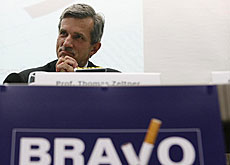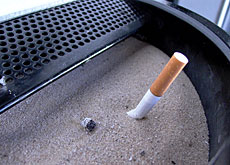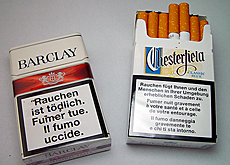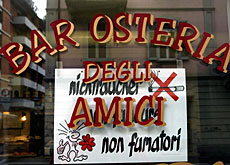Public’s view of tobacco goes up in smoke

Thomas Zeltner, director of the Federal Health Office, tells swissinfo how the public's realisation that tobacco is harmful has resulted in a shift in attitudes.
The health office has nevertheless set itself a target of reducing the number of smokers from 30 per cent of the population to 20 per cent over the next ten years.
Its anti-tobacco drive is bearing fruit. Since 2001 the percentage of smokers in Switzerland has dropped from 33 per cent to 30 per cent and among young people from 31 per cent to 25 per cent.
The new campaign, “Bravo”, congratulates outlets and organisations which have introduced smoking-free areas and calls on others to protect non-smokers.
Zeltner, a 59-year-old doctor, has been the health office’s director since 1991.
swissinfo: You’re strongly anti-smoking. Have you ever given up smoking yourself?
Thomas Zeltner: I never really started. Like many young people I used to smoke, but I could never inhale deeply as I’d have a coughing fit. As a result I gave up pretty quickly.
swissinfo: Locals in the bar puffing on cigars – until recently this was still an image of relaxed sociability across the country. Now it’s an attack on the nation’s health. How did that happen?
T.Z.: The Swiss, like many other Europeans, have noticed that tobacco is a harmful drug. That has led to a paradigm shift in thinking. People have also come round to the view that non-smokers should not be forced to smoke passively.
swissinfo: Cigarette advertising is much less noticeable nowadays in the media and in public. Does this play a role?
T.Z.: Definitely. In the old days people would light up on television or in meetings – not any more. In that sense there has been a change in norms. Today the standard behaviour is that people don’t smoke in the presence of others; previously people would smoke and then ask whether it disturbed anyone.
Today this shift is least noticeable in bars. For many people smoking went hand in hand with eating and drinking. Today the bulk of the population is calling for restaurants to be no-smoking zones.
swissinfo: Compared with many European countries, especially those in Scandinavia, Switzerland was always a poor role model for smoking. When did the change come?
T.Z.: That’s exactly right. For a long time Switzerland was legally liberal and tolerant when it came to smoking.
The shift started between 1995 and 2000. We’ve noticed it considerably during the past five years.
swissinfo: “Bravo” – what does this praise from your current campaign mean?
T.Z.: “Bravo” should be a signal that it is possible – and not so hard – to build up a protection for non-smokers. It should also encourage those outlets and organisations who still feel this would be difficult and lead to conflict to do the same.
We had many discussions with the Swiss Federal Railways, who were concerned whether to go ahead with [the smoking ban] and whether it would lead to a passenger revolt.
We have since seen that the introduction of no smoking on public transport has gone without a hitch.
swissinfo: Communities want to introduce smoking bans for young people. Smokers applying for a job at the World Health Organization will be rejected. How far would you go here?
T.Z.: We think it’s wrong to not employ or to fire people because they smoke. Smoking bans in schools on the other hand are a good idea – but school staff should then not be allowed to smoke.
Everyone who works in a building should be protected, not just a small group.
swissinfo: The number of young smokers dropped in 2005. What needs to be done to continue this, other than bans?
T.Z.: One of the most significant factors is cost – young people are very price sensitive. They also respond greatly to advertising. For that reason we should reduce the amount of advertising in public – something more and more cantons are doing.
We are also discussing a ban on selling tobacco to young people, similar to that on alcohol [currently kiosks and shops agree not to sell to under-16s but would not be committing a crime if they did]. I’m personally not in favour of that unless we introduce at the same time regulation for cigarette vending machines – it would be pointless if it were illegal to buy cigarettes at a kiosk but you could run round the corner and get them from a machine.
swissinfo: The number of smokers dropped by ten per cent last year. Are you not getting grief from the tobacco lobby?
T.Z.: Not personally, but they have got problems and have cut their prices and thus their profit margins. This backs up our view that cost is a major influence on consumption.
We have even heard from the industry that where prices have been lowered, consumption has increased again. That’s obviously not good news.
swissinfo: A smoke-free society – is that your goal?
T.Z.: Not at all. We want neither a drug-free nor a smoke-free society. We are however aiming for the number of smokers in Switzerland to drop from the current level of 30 per cent to 20 per cent within ten years.
swissinfo-interview: Andreas Keiser
The protection of non-smokers in the workplace has been part of Swiss employment law since 1992.
In 1993 more than 70 per cent of voters rejected the so-called Twin Initiative which called for a comprehensive ban on tobacco and alcohol advertising.
In March 2006, 80 per cent of voters in Ticino approved of a ban on smoking in public places.
Smoking on Swiss trains has been illegal since December 2005.
There are around two million smokers in Switzerland.
Switzerland has one of the highest rates of tobacco consumption in Europe. Regular smokers on average consume more than 20 cigarettes per day.
About 8,000 people die from smoking-related illnesses in Switzerland each year, according to the Federal Health Office.
60% of the public approve of an increase in the cost of a packet of cigarettes from the current price of SFr5.80 ($4.80) to SFr6.90.
64% want smoke-free pubs.
67% want further restrictions on tobacco advertising.
90% want selling tobacco to young people to be made illegal.

In compliance with the JTI standards
More: SWI swissinfo.ch certified by the Journalism Trust Initiative




You can find an overview of ongoing debates with our journalists here. Please join us!
If you want to start a conversation about a topic raised in this article or want to report factual errors, email us at english@swissinfo.ch.